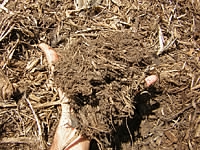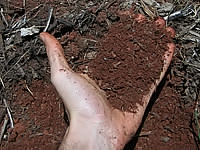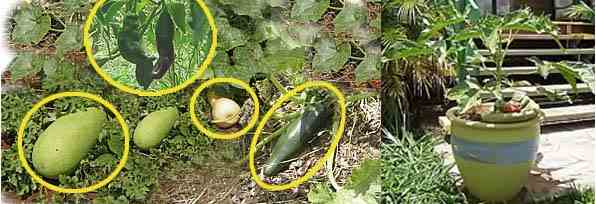The Golden Age Lifestyle
Extend the Garden in
Your Heart to
Your Own Back Yard
By Brother-initiate Matthew Sirpis, Cairns Highlands, Australia
(Originally in English)
Upon reading The Supreme Master Ching Hai News No. 161, I was filled with gratitude to Master for Her efforts in uplifting our planet. Next to Her greatness and the immensity of the universe, we and our planet are infinitely small. Yet our own consciousness is ever expanding as we move toward a new global community, one based on love and understanding rather than the old ways humankind has known for so long.
Thus, it seems that the best way we can help Master is by following our intuition, acting in accord with the principles of the new age of enlightenment and extending our love to all things by caring for our environment in every way possible. Because even though each of us is a small part of the whole, our actions have profound consequences.
For example, many of today’s farmers still use chemical fertilizers, which are damaging both to the environment and to our health. Moreover, most of these non-organic compounds are derived from petrochemicals or sewage treatment plant sludge, and over time the nutrient imbalance they induce degrades the soil. These chemicals can also contain heavy metals that are toxic to most biological organisms even in small quantities.
But these problems can be mitigated through the practice of organic vegetable gardening, which is easier than you might imagine. All it requires is a small plot of soil, sunshine, water and time. If prepared well, an organic garden requires little maintenance, and you may soon find that caring for and loving the plants that feed you is actually a beautiful experience.
Plants do have intelligence and feelings and growing a garden is like having a good friend. The garden will give you fresh, organic food every day, which has the added benefit of reducing your shopping bill. Other healthful benefits are the exercise you gain and the enjoyable time you spend outdoors.
There are many ways to grow a vegetable garden. For example, if you have a back yard you can clear away some grass and plant one there, and if not you can use pots. In this case, make sure the potted plants are placed in a sunny location and that they receive adequate water, as pots dry out more easily than soil in the ground. Also, use an organic potting mix or other good soil mix to grow your plants.
To create a garden in your back yard, avoid simply destroying the grass but instead remove it in an organic way, as this will leave valuable mulch in the ground. For instance, you can mow the grass down very low and then cover the area with grass clippings, fallen leaves, wood shavings, newspapers, hay and the like. These materials will eventually break down and leave a rich garden bed.
 |
 |
Mulch—organic matter in the process of being composted |
Good soil mix—soil after
|
To prepare a larger area for your garden, I have found it effective to cover the grass with black plastic. Even though this method removes friendly organisms such as earthworms, bacteria and fungus that contribute to your soil’s health, these creatures will return over time. After you cover the grassy area, check it in approximately a week, depending on how hot the weather has been and how much sun has been hitting the plastic. Once the grass has turned brown and looks as if it will not grow back, you can add organic fertilizer such as cow manure or compost produced from recycled food scraps*.
For any size of outdoor garden, the next step is to add mineral nutrients, also known as rock dust, which are available from any nursery. Then use a pitch fork to work the compost and minerals into the soil and water the ground well. Your soil should now be loose enough to dig using your hands. If not, add more compost, grass clippings or moldy leaves. Adding gypsum (a form of calcium available at nurseries) is also good to help break up hard clay soils. Then let the soil rest for a week before planting.
To prepare for planting, buy seeds that will grow in your area during the time of year you intend to plant them. (Look for this information on seed packet labels.) Choose seeds that are labeled organic or at least avoid ones that state they are hybrids, as these may be genetically modified. Also, most plants require plenty of sun and water to grow well; read the label on the seed packet for specific recommendations.
As a general guideline, sow beans and legumes, which add the important nutrient nitrogen to the soil, before planting nutrient-hungry plants such as tomatoes. Another suggestion is to plant lots of parsley, which is highly nutritious and will provide food for up to two years as long as you continue to remove the outside leaves.
After your seeds have germinated and the plants are growing well, cover the soil between them with mulch, hay or grass clippings but avoid directly touching the plants with these materials because as they decompose they may burn the plants. Also, practice good crop rotation; that is, avoid planting the same plants in the same location twice in a row.
Finally, look at your plants, talk to them, give them love and play Master’s chanting tapes to help them grow and become more pest-resistant. They will respond by giving you abundant harvests. Even a small vegetable garden can provide enormous amounts of food for a small family.
With a little patience, lots of love and an occasional conversation with your plants you will have a luscious garden growing in no time and become healthier for it. Moreover, the love we share with the environment and our fellow beings in the plant kingdom can remind us of the great love our Master shares so willingly with us all. ♥
 |
Vegetables grown by the author—pumpkins, a zucchini, watermelons and tropical capsicums |
Note: For more detailed information on making compost, please visit the following sites:
http://www.compostguide.com
http://www.gardenorganic.org.uk/organicgardening/gh_comp.php